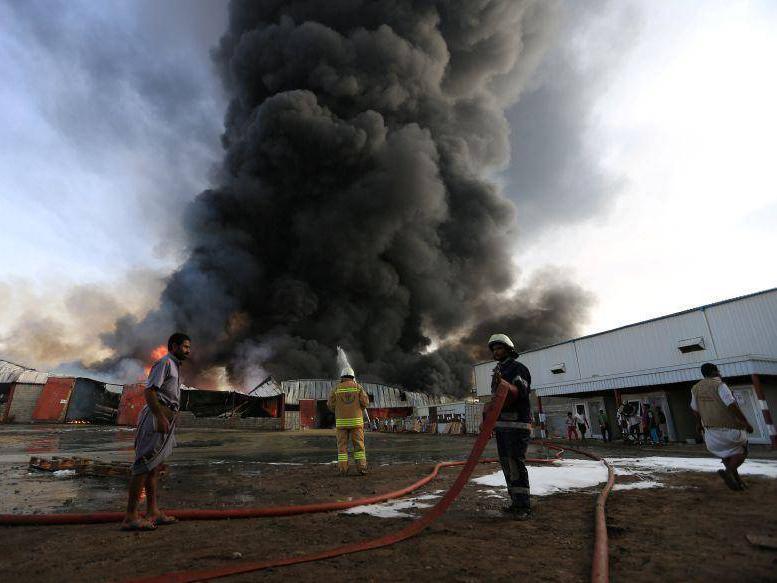UK government could be forced to ban Saudi arms sales after campaigners win right to appeal ruling
Government says it has 'robust' arms control regime after High Court found in its favour last year

British weapons sales to Saudi Arabia could be ruled unlawful after the second round of legal action by campaigners was given the go-ahead.
Judges have granted the Campaign Against the Arms Trade (CAAT) permission to appeal a ruling by the High Court in July that allowed the UK to continue granting export licences despite allegations British weapons had been used to kill civilians in Yemen.
The fresh case against the Secretary of State for International Trade will be heard by the Court of Appeal in the coming months.
Lawyers representing CAAT argued that the decision to grant the licences was against British arms export policy, which states that the government must deny applications “if there is a clear risk that the items might be used in the commission of a serious violation of international humanitarian law".
Supported by charities including Amnesty International, Human Rights Watch and Oxfam, they claim that the ongoing civil war in Yemen, where the UN says Saudi-led forces have been bombing “trapped civilians” in support of president Abdrabbuh Mansur Hadi's government, is such a risk.
Giving permission for the appeal at the Court of Appeal on Friday, Lord Justice Irwin and Lord Justice Flaux said that the criterion was put in place by legislation under the Export Control Act 2002, in response to obligations arising from the United Nations Arms Trade Treaty 2013 and from a common position adopted by the European Union.
The judges warned that the law did not permit "political considerations" or opinions on the outcome of Saudi bombing to override the ban on exporting weapons that could be used to commit war crimes.
"It is obvious that withholding this licence, or renewal of this licence, is likely to have significant implications for the international relations of the United Kingdom, and potentially for employment," they added.

"[Political considerations] might include, for example, anticipation of the consequences of the cessation of arms sales to Saudi Arabia, including a judgement as to whether that would likely make matters worse rather than better in Yemen. However, such considerations do not form part of the criteria for the grant or withholding of a licence to export arms.
"Parliament did not permit sales, otherwise in breach of the criteria, to be justified on such a basis. They are considerations extraneous to the decision and to the legality of the decision."
The government said that it operates “one of the most robust export control regimes in the world” and keeps sales under careful review to meet standards of the Consolidated EU and National Arms Export Licensing Criteria.
CAAT says that while thousands of people have been killed in Saudi-led bombing, and many more as a result of an ongoing humanitarian “catastrophe” and famine, the UK has licensed £4.6bn worth of arms sales to Saudi Arabia.
According to official figures, £2.7bn were in a category including aircraft, helicopters and drones, and another £1.9bn including bombs and missiles.
Andrew Smith, of CAAT, said: “The Saudi-led bombardment of Yemen has killed thousands of people and created one of the worst humanitarian disasters in the world.
“Despite this, the Saudi regime has been armed and supported every step of the way by successive UK governments.
“We believe that these arms sales are immoral, and are confident that the Court of Appeal will agree that they are unlawful.”
Rosa Curling, of law firm Leigh Day, said evidence shows a “clear risk the arms sold from the UK might be used in serious violation of international law”.
“Where our politicians have sadly failed to follows UK legislation and policy, our client hopes the Court will ensure the rule of law is upheld,” she added.
The decision to grant permission for the appeal was welcomed by humanitarian agencies and charities.
Save the Children warned the “battle isn’t over yet”, following the death or injury of at least 6,000 children in Yemen.
“The UK government has both a moral and legal obligation to ensure British-made weapons aren’t killing and maiming children in Yemen,” a spokesperson added.
Rocco Blume, head of policy at War Child UK, said the “man-made tragedy” shows no sign of coming to an end.
“The UK now, more than ever, must do everything it can to help protect the lives of children caught up in this,” he added.
“All evidence shared publicly makes it clear that the UK government has blood on its hands as long as it sells arms to Saudi Arabia.”
Shane Stevenson, Oxfam's country director in Yemen, said it was impossible for the UK to support peace negotiations when it is also an “arms dealer”.
“Yemen is on the brink of famine and homes, hospitals and schools have been destroyed in a brutal war,” he added. “An end to the fighting is desperately needed.”
Join our commenting forum
Join thought-provoking conversations, follow other Independent readers and see their replies
Comments
Bookmark popover
Removed from bookmarks